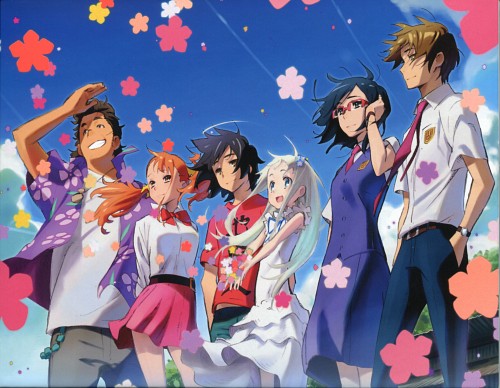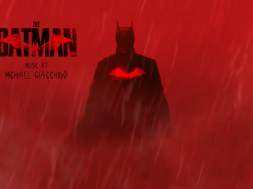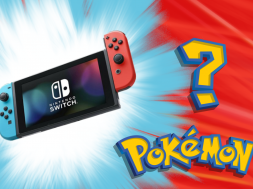

There’s something undeniably cathartic about the quick doses of emotional devastation that genuinely good fiction can inflict. Maybe we’re all secretly masochists or something, but I’ve often found that the stories that test our tear ducts are usually the ones that hit the hardest and stick around the longest. A little while ago, a little jaded with life and in search of a reminder that I still retained the capacity to feel things, I went in search of something that would open up those floodgates. After some digging, I found a show called Ano Hi Mita Hana no Namae o Bokutachi wa Mada Shiranai, frequently, and thankfully, shortened to Anohana. Anohana had an impressive rep, with many reviews putting it on par with Grave of the Fireflies in terms of emotional impact. Itching for a fix of feels, I dove in.
I was not adequately prepared.
 Anohana is the story of a group of young adults who, having drifted apart following the death of one of their friends, find themselves drawn together again by mysterious circumstances. The ghost of their fallen friend, Menma, has started following Jintan, our leading man, around and although he’s hesitant to let anyone know – he could be hallucinating after all – it isn’t long before the secret gets out and the group find themselves reluctantly reunited. What follows is a brilliantly absorbing, character driven piece about life, loss and letting go. Undoubtedly, part of what makes it so hugely affecting is its score, composed by Okinawa born songwriter Reimy. Let’s take a look at what makes the music of Anohana such an integral part of the experience. Be warned; if you’ve seen the show, prepare for some involuntary lower lip quivering.
Anohana is the story of a group of young adults who, having drifted apart following the death of one of their friends, find themselves drawn together again by mysterious circumstances. The ghost of their fallen friend, Menma, has started following Jintan, our leading man, around and although he’s hesitant to let anyone know – he could be hallucinating after all – it isn’t long before the secret gets out and the group find themselves reluctantly reunited. What follows is a brilliantly absorbing, character driven piece about life, loss and letting go. Undoubtedly, part of what makes it so hugely affecting is its score, composed by Okinawa born songwriter Reimy. Let’s take a look at what makes the music of Anohana such an integral part of the experience. Be warned; if you’ve seen the show, prepare for some involuntary lower lip quivering.
My Star
My Star is exactly the type of piece you’d expect to hear in something like Anohana. Slow and delicate, even when it swells, the piano carries a steady, flowing melody over a textural bed of strings, a bed which temporarily and ever so subtly sneaks in a key change at around 1.40 just to mix things up. My Star is quiet and never reaches the crescendo it feels like it deserves. It feels lost, sure of its existence but unsure of its purpose. It knows where it is, but not where it’s going. We’re just happy to be along for the ride.
Sunset
This one is slightly more interesting. Sunset begins with some gorgeous guitar and piano interplay. Both instruments share the same melody before the cello sweeps in, grabs the melody and modulates the whole thing rather abruptly. Eventually, the three solo instruments band together, the returning guitar and piano motif augmented by some elegant counterpoint in the cello. They even modulate together the second time. Sunset, in addition to being simply beautiful to listen to, shows the good banding together, even in times of disagreement, can do.
Last Train Home
Last Train Home is the first track that shows up in most online searches for Anohana OST. It appears frequently throughout the show and its presence is usually a warning that you’re gonna need to have tissues on hand. Unfortunately, by the time you notice the twinkling, delicate-as-porcelain piano running through the mesmerizing looping melody, your tears will probably already have reached the floor.
Kimi ga Kureta Mono
I don’t usually include OP’s or ED’s in High Score but I feel an exception has to be made for Anohana. Kimi ga Kureta Mono closes out each episode of this show and usually fades in before the cut to credits. The first few times I heard it I thought it was quite nice, but nothing special. After hearing it play alongside some of the more emotionally powerful moments of each episode’s closing moments, I started to notice the inherent sadness in it. The descending vocal motifs, in addition to being ridiculously catchy, only serve to add to the already morose production. The drums are filtered out and the whole thing is much more sparse than it initially appears.
***
Anohana deals with some pretty weighty themes; coping with guilt and loss, forgiving yourself and others, and even finds room to talk about some smaller ones – rekindling broken friendships, atoning for past indiscretions – that its audience are much more likely to relate to. Even though it eventually takes a slightly stronger turn for the supernatural, it takes its time exploring the effect that Menma’s death has had on everyone involved beforehand, culminating in one incredibly visceral moment with Menma’s mother, so it’s easily forgiven. Reimy’s music sounds slightly cookie-cutter at first, but given time it reveals itself to be an absolutely integral and truly reflective part of the Anohana experience.
Be prepared though. Anohana will crush you.











